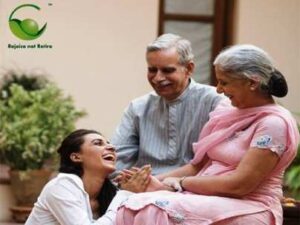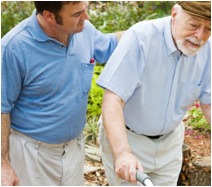Senior citizens are most valuable and most vulnerable community. A society is best judged by how it treats the aged. #KhabarLive share insights on how startups will play a critical role in delivering the vision of a senior-friendly India, that provides compassionate care to the elderly, with minimum fuss and maximum impact.
 Why Senior citizens in India are largely ignored?
Why Senior citizens in India are largely ignored?
It has always surprised us that with such a massive population of senior citizens, India still does not have a well-organised senior care industry. There are seemingly so many opportunities to improve the financial, social and physical well-being of the elderly. Yet, this industry often feels bereft of both technological innovation and entrepreneurial success.
Why Senior care is a challenging sector?
Indian policy makers and businesses have largely ignored the massive needs of 110 million senior citizens – almost eight per cent of our population. The litany of challenges is many. Prohibitive healthcare expenses are an over-arching concern that dominates most families with an older loved one. Finding trained care givers, especially at home, is a substantial problem. Technology adoption among and therefore online participation of the elderly is poor. Lack of age-appropriate products, designed specifically for the elderly, is another issue. Elderly abuse and personal safety are emerging trends. Depression, isolation and fall risks at home are among other major worries for this demographic.
However, in spite of these gaping need gaps, the Indian senior care industry is both — unorganised and fragmented. There are historical, operational, social and financial reasons for this situation.
Why Public policy has been inadequate?
Successive governments have overlooked the needs of the aged – be it good quality universal healthcare, reasonable state pension for the vulnerable, decent tax breaks for senior citizens or investments in improving elder-friendly infrastructure. Some of these initiatives will require significant policy agreement between multiple agencies and large amounts of funding. For most governments, there were probably more pressing political imperatives that needed attention or inadequate resources to push through significant change. Ultimately, policy making and execution of even those policies that do exist remain inadequate. Poor regulatory frameworks have certainly impeded the growth of the sector and stymied private investments.
Why, Always, Financial viability of the sector remains a concern?
Entrepreneurs and businesses on the other hand have found the senior care industry hard to scale up in, difficult to innovate for and tough to deliver consistent shareholder returns in. Many starry-eyed start-ups, wooed by the apparent size of the market gap, have launched, burnt and crashed quickly.
 The senior care market often feels like the last frontier – for change, innovation, training and technology. At Tribeca Care, we love to solve big problems for real families – and we cannot think of a bigger industry with more real problems worth solving.
The senior care market often feels like the last frontier – for change, innovation, training and technology. At Tribeca Care, we love to solve big problems for real families – and we cannot think of a bigger industry with more real problems worth solving.
Senior care needs collaborative mentality and efforts
As a nation, we have been taught to respect our seniors. We pride ourselves as a family-friendly society where older relatives are not only included, but much loved. So, why, in spite of these cultural and social reasons, do more and more elderly feel neglected or even forgotten by our wider society?
Family structures are changing fast
Part of the problem of course is that in the new “global” India, family structures are fast evolving – with nuclear families more the norm than exception. Traditionally, families took care of their own elderly – diligently, cost-effectively and with a sense of duty. That safety-net is rapidly eroding, and we urgently need a new way of delivering compassionate care that can still scale fast enough for investors to drive reasonable returns.
What India desperately needs is a vibrant senior care industry that is delivering great quality services within strong regulatory frameworks. We need an industry where NGOs, entrepreneurs and large corporates partner with families to create cost-effective solutions. This ecosystem must be driven by a spirit of “social enterprise,” where business interests, technological innovation, government policies and geriatric expertise combine powerfully to create tremendous social good.
Solutions need partnerships
Yet, an industry takes time to be born, adopted, and then accepted. Among some adult children, there is discomfort or even guilt in “outsourcing” care of an older loved one to an external agent. Within the elderly population, there are barriers to change – whether it be accessing technology or moving to a senior living facility which is not their family home.
The elderly, their families, caregivers, home care platforms, hospitals, insurance companies, doctors, financial advisers and many others are part of the wider ecosystem serving the elderly. Without the participation of a substantial part of that ecosystem, most solutions will remain piecemeal and inadequate.
Why Elder Care is a complex beast?
Let us explain this with an example. If a 75-year-old diabetic with mild depression is living alone and needs to be hospitalised for a heart attack, the complexity of managing that case is non-trivial. Ideally, there should be a personal alarm that triggers an ambulance call out. A relative or professional caregiver then helps admit the patient with appropriate health insurance documentation, if necessary. The medical updates from the cardiologist need to be communicated to the son abroad. After surgery, on release home, 24/7 nurses are needed to take care of the patient. A trained psychologist will be required to manage his mental health or anxiety in the long run. The endocrinologist needs to be consulted regularly to control blood sugar levels. So, just that one incident (the heart attack) will require almost 10 different players to play their part over a period of weeks for a seamless case management!
Technology and customisation are equally critical
We fully understand that a “one-size-fits-all” approach is doomed to fail. Senior citizens are not a homogeneous group. The wants of an active 65-year old elderly with a comfortable central government pension is fundamentally different from the needs of a destitute 85-year-old widow with no roof over her head.
 Solutions need to be catered for each family. They need to be affordable, sensible, safe and replicable. Technology, processes, protocols, partners and people help elder-care businesses scale with customised solutions!
Solutions need to be catered for each family. They need to be affordable, sensible, safe and replicable. Technology, processes, protocols, partners and people help elder-care businesses scale with customised solutions!
For the elderly, the first waves of digital change are finally crashing on their doorsteps.
Increasingly tech-enabled solutions – including tele-medicine, connected devices and AI platforms – are being developed to facilitate care for the elderly. This will revolutionise the way we manage chronic diseases, change medications, or even attend to emergencies, thereby reducing the need for the elderly to physically visit doctors or hospitals.
Technology can also help manage elderly depression and anxiety — from simple phone-based psychological support helplines to AI-powered cameras that connect at-risk seniors remotely to psychiatrists.
Conversational robots are being programmed to provide tailored support to seniors who are at risk of social isolation. Protocol-based technology promises to transform mental health delivery in the future.
From reading newspapers on an app to joining an online senior-friendly exercise group to browsing e-commerce platforms to watching Bollywood movies, the elderly are increasingly discovering an engaging virtual world completely unknown to them before coronavirus.
We believe that more committed entrepreneurs with patient financial sponsors will use digital technology to revolutionise every aspect of elderly life – be it personal safety, emergency response, medical care, financial inclusion, or social engagement.
Ultimately, we need to care for our elderly much better. A society is best judged by how it treats the aged. Start-ups will play a critical role in delivering that vision of a senior-friendly India – an India that provides compassionate care to the elderly, with minimum fuss and maximum impact. #KhabarLive #hydnews
Elder care, senior care, geriatric care…call it what you may, here is an industry set on a growth trajectory like none other. According to the Global Health and Aging report by the World Health Organization, people aged 65 and above is projected to grow from an estimated 524 million in 2010 to nearly 1.5 billion in 2050, specifically in developing nations. Needless to say, such an upsurge in the ageing populace will ultimately bring about significant attention towards geriatric care services, consequently advancing the market growth. In the US alone, senior care is an established industry valued at $740 Billion at present and growing at 6% per year.
On the other hand, having invested in the domain myself, in Sukino Healthcare, India’s leading provider of long-term health care management for patients with chronic ailments, I first-hand recognize that not only is eldercare a rapidly maturing industry, but also highly driven and evolving.
Ø What Does The Picture In India Look Like?
India is certainly a young nation with 65% of its population under the age of 35 years, nevertheless, there are 110 million elders in this country above the age of 60, 8% if the total population, with 40% of this number living in urban India. Nearly % of the population or 340 million people will be above 60 by 2050 reports. In comparison, in Japan, which is considered one of the most ‘aged’ populations, 35.57 million people or 28% of the population or are over 65. The elder care market in India today stands at an enormous $1.5 billion catering to anything from adult diapers to diagnostic and medical services, from senior citizens residential complexes and security devices to hospice care. Adding to these figures has been the COVID 19 pandemic that has presented an over 40% surge in the Indian elder care market.
Ø An Enormous Opportunity For Startups
This segment has caught the eye of many first-generation entrepreneurs and healthcare practitioners, who have sensed a gap in terms of products and services designed specifically for the 60+ age group. Also, it is quite astounding to see how this group of people, not just in terms of technology, but also in the sense that they are willing to spend more on themselves. Just about a decade ago, senior citizens often kept their income as legacy to be handed over to the next generation. But that is not the situation anymore. Today, there is disruption in every facet of the 60+ consumerism, say for example, in platforms devoted to products designed to solve everyday issues faced by senior citizens, travel industry that is fashioning exclusive tours and travels meant only for the elderly, digital magazines that are offering an assortment of content relevant to this generation and various food items uniquely for this section.
Ø Digital Solution Will Come To The Rescue
As boomers age, they want to do so actively, gracefully and independently. Technology is being viewed as the big disruptor that will allow them to achieve those goals. And that’s presenting a huge opportunity for entrepreneurs developing these types of products. According to a survey by Consumer Technology Association, in the US, while health and remote care lead the way, wellness and fitness technologies for seniors is expected to reach $900 million by 2022.
Regardless of age, older adults can and do benefit from using technology. They use technology to communicate with loved ones, to stay up to date on news, to monitor and manage their health and safety, to research information, to entertain themselves and so much more. The desire of many seniors to remain independent well into their later years is creating an unprecedented market for tech innovation, presenting investors and entrepreneurs with massive opportunities.
Health-care systems in India need to attend to the elderly. Care for this segment of the society is rapidly developing as an indispensable component of both the public and private concern. The vital need at present is to conduct studies and discover new objectives in examining population ageing with social and technological innovations required to immediately respond to this. The priority initiative will be to have a minimal needs programme that should include primary care, nutritional needs, provision of assisted devices, counselling services, social security and pension, community training for elderly care at home and referral care for those who need it. Steps should be introduced by the Government of India towards financing and empowering family members & caregivers to support the elderly. With such high percentage of population, as the numbers denote, not having the financial capacity to afford healthcare and a rapidly ageing population, there is a dire need for a structured and well-financed elderly care infrastructure.
If the 2030 Agenda and the Sustainable Development Goals are to the recognized that says that development can be attained only when there is inclusivity amongst people of all ages, empowering older persons and enabling their full participation and social inclusion in good health might just be a few ways to reduce inequalities. #KhabarLive #hydnews







